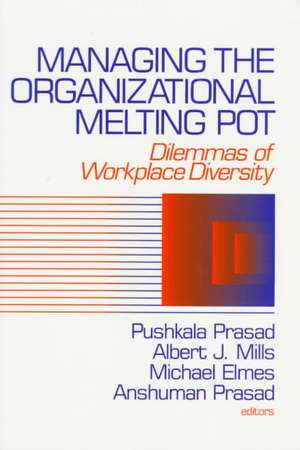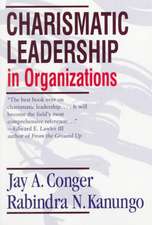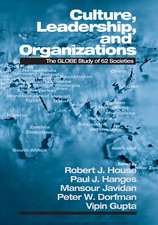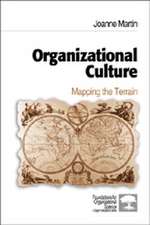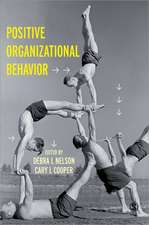Managing the Organizational Melting Pot: Dilemmas of Workplace Diversity
Autor Pushkala Prasad, Albert J Mills, Michael Elmes, Anshuman Prasaden Limba Engleză Paperback – 5 iun 1997
Preț: 800.47 lei
Preț vechi: 976.17 lei
-18% Nou
Puncte Express: 1201
Preț estimativ în valută:
153.17€ • 159.61$ • 126.82£
153.17€ • 159.61$ • 126.82£
Carte tipărită la comandă
Livrare economică 03-17 aprilie
Preluare comenzi: 021 569.72.76
Specificații
ISBN-13: 9780803974111
ISBN-10: 0803974116
Pagini: 403
Ilustrații: black & white illustrations
Dimensiuni: 154 x 229 x 25 mm
Greutate: 0.66 kg
Ediția:1
Editura: SAGE Publications
Colecția Sage Publications, Inc
Locul publicării:Thousand Oaks, United States
ISBN-10: 0803974116
Pagini: 403
Ilustrații: black & white illustrations
Dimensiuni: 154 x 229 x 25 mm
Greutate: 0.66 kg
Ediția:1
Editura: SAGE Publications
Colecția Sage Publications, Inc
Locul publicării:Thousand Oaks, United States
Cuprins
PART ONE: INTRODUCTION
From Showcase to Shadow - Pushkala Prasad and Albert J Mills
Understanding the Dilemmas of Managing Workplace Diversity
PART TWO: THEORIZING THE DILEMMAS OF WORKPLACE DIVERSITY
(In)corporating the Other? Managing the Politics of Workplace Difference - J Michael Cavanagh
The Sexually Specific Subject and the Dilemma of Difference - Collette Oseen
Re-Thinking the Difference in the Construction of the Non-Hierarchical Workplace
The Unbearable Whiteness of Being - Roy Jacques
Reflections of a Pale, Stale, Male
Class Discipline - Richard Marsden
IR/HR and the Normalization of the Workforce
The Protestant Ethic and Myths of the Frontier - Pushkala Prasad
Cultural Imprints, Organizational Structuring and Workplace Diversity
Dreams of Diversity and the Realities of Intergroup Relations in Organizations - Michael B Elmes and Debra L Connelley
PART THREE: DILEMMAS OF DIVERSITY MANAGEMENT IN PRACTICE
Dueling Discourses - Albert J Mills
Desexualization versus Eroticism in the Corporate Framing of Female Sexuality in the British Airline Industry, 1945-60
Women in the Academy - Pat Bradshaw and David Wicks
Cycles of Resistance and Compliance
`We Have To Make a Management Decision' - Mark Maier
<i>Challenger</i> and the Dysfunctions of Corporate Masculinity
When Organizations Do Harm - Paula Caproni and Joycelyn Finley
Two Cautionary Tales
The Colonizing Consciousness and Representations of the Other - Anshuman Prasad
A Postcolonial Critique of the Discourse of Oil
Triple Jeopardy - E Joy Mighty
Immigrant Women of Color in the Labor Force
How International Is International Management? Provincialism, Parochialism, and the Problematic of Global Diversity - Diana J Wong-MingJi and Ali Husain Mir
PART FIVE: CONCLUSION
Issues in the Management of Diversity - Anshu Prasad and Michael B Elmes
From Showcase to Shadow - Pushkala Prasad and Albert J Mills
Understanding the Dilemmas of Managing Workplace Diversity
PART TWO: THEORIZING THE DILEMMAS OF WORKPLACE DIVERSITY
(In)corporating the Other? Managing the Politics of Workplace Difference - J Michael Cavanagh
The Sexually Specific Subject and the Dilemma of Difference - Collette Oseen
Re-Thinking the Difference in the Construction of the Non-Hierarchical Workplace
The Unbearable Whiteness of Being - Roy Jacques
Reflections of a Pale, Stale, Male
Class Discipline - Richard Marsden
IR/HR and the Normalization of the Workforce
The Protestant Ethic and Myths of the Frontier - Pushkala Prasad
Cultural Imprints, Organizational Structuring and Workplace Diversity
Dreams of Diversity and the Realities of Intergroup Relations in Organizations - Michael B Elmes and Debra L Connelley
PART THREE: DILEMMAS OF DIVERSITY MANAGEMENT IN PRACTICE
Dueling Discourses - Albert J Mills
Desexualization versus Eroticism in the Corporate Framing of Female Sexuality in the British Airline Industry, 1945-60
Women in the Academy - Pat Bradshaw and David Wicks
Cycles of Resistance and Compliance
`We Have To Make a Management Decision' - Mark Maier
<i>Challenger</i> and the Dysfunctions of Corporate Masculinity
When Organizations Do Harm - Paula Caproni and Joycelyn Finley
Two Cautionary Tales
The Colonizing Consciousness and Representations of the Other - Anshuman Prasad
A Postcolonial Critique of the Discourse of Oil
Triple Jeopardy - E Joy Mighty
Immigrant Women of Color in the Labor Force
How International Is International Management? Provincialism, Parochialism, and the Problematic of Global Diversity - Diana J Wong-MingJi and Ali Husain Mir
PART FIVE: CONCLUSION
Issues in the Management of Diversity - Anshu Prasad and Michael B Elmes
Descriere
Some of the more troublesome and disturbing aspects of workplace diversity are illuminated in this volume - individual and institutional resistance, the effectiveness of diversity change efforts and the less visible ways in which exclusion and discrimination continue to be practised in the workplace.
To help the reader understand some of these dilemmas, the contributors adopt a number of theoretical frameworks which are striking departures from traditional perspectives on diversity. These include: intergroup relations theory; critical theory; Jungian psychology; feminism; post- colonial theory; cultural history; postmodernism; realism; institutional theory; and class analysis. In addition, they examine different organizatio
